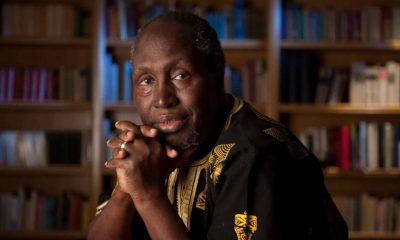Arts & Books
Kenyan literary icon Ngũgĩ wa Thiong’o dies at 87

The world of literature is mourning the loss of one of Africa’s most revered intellectuals and storytellers, Ngũgĩ wa Thiong’o, who passed away at the age of 87. His daughter, Wanjiku wa Ngũgĩ, confirmed his death in a heartfelt statement posted on Facebook on Wednesday, describing her father as having “lived a full life” and “fought a good fight.”
While the family has yet to disclose the cause or place of his death, Wanjiku encouraged fans and admirers of the literary icon to celebrate his enduring legacy. The family spokesperson, Nducu wa Ngũgĩ, is expected to announce details of his celebration of life in the coming days.
In recent years, Ngũgĩ had reportedly been battling kidney-related health issues, which may have contributed to his declining health.
Ngũgĩ wa Thiong’o, born James Ngugi in 1938 in Kamiriithu, near Limuru in colonial Kenya, rose to prominence in the 1960s with the publication of his early novels Weep Not, Child (1964), The River Between (1965), and A Grain of Wheat (1967). These works quickly established him as a leading voice in postcolonial African literature.
His writing, often politically charged, chronicled the complex intersections of colonialism, culture, and identity in Kenya and across Africa. Ngũgĩ was also an outspoken advocate for African languages, famously choosing to write in his native Kikuyu language rather than English—a move that he argued was central to decolonising African literature and thought.
His 1986 theoretical work Decolonising the Mind became a seminal text in postcolonial studies, making an impassioned case for linguistic and cultural emancipation.
Ngũgĩ’s life as an intellectual was deeply entwined with his activism. In 1977, after staging a politically charged play, Ngaahika Ndeenda (I Will Marry When I Want), written in Kikuyu and performed by peasants and workers, he was arrested by the Kenyan government and detained for over a year without trial. During his incarceration, he famously wrote his novel Devil on the Cross on toilet paper using a smuggled pen.
Following his release, Ngũgĩ faced continued harassment from the authorities, prompting his exile. He lived in the United Kingdom before settling in the United States, where he served as a Distinguished Professor of English and Comparative Literature at the University of California, Irvine.
Over the decades, Ngũgĩ wa Thiong’o’s literary prowess earned him numerous accolades and honorary doctorates. Though he never received the Nobel Prize in Literature—despite being widely tipped as a strong contender multiple times—his influence remains unparalleled in African and global literary circles.
His later works, including The Perfect Nine (2020), a mythic feminist epic about the origin of the Gikuyu people, and his prison memoir Wrestling with the Devil, continued to push creative and ideological boundaries, merging oral tradition with formal literary innovation.
Legacy
Ngũgĩ wa Thiong’o’s death marks the end of an era for African literature, but his legacy endures through his profound contributions to literature, language, and cultural resistance. He leaves behind a body of work that not only chronicled the African experience but also challenged the world to reckon with the legacy of colonialism and the power of language.
He is survived by his children, including writers Wanjiku wa Ngũgĩ and Nducu wa Ngũgĩ, and countless readers, students, and admirers who continue to draw inspiration from his life and words.
Funeral and memorial arrangements are expected to be announced by the family in the coming days.




